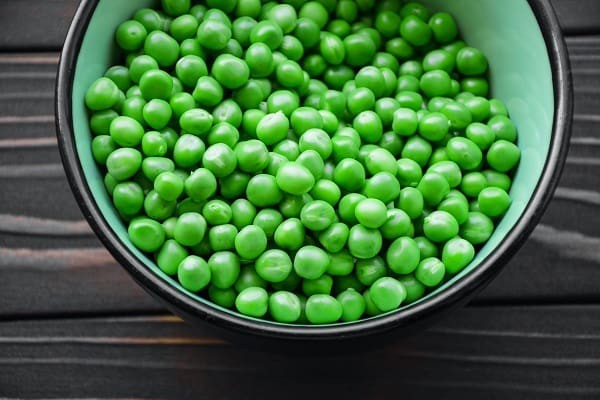The Unsung Protein Powder Hero You Know Nothing About

The benefits of pea protein powder
We love a supplement gladiatorial battle.
And this study did just that: comparing pea protein to whey protein and a placebo.
***Sound the bugles, please.***
161 males from the ages of 18-35 participated in the research for 12 weeks.
The men trained their biceps and were randomised to take either 25 grams of either pea protein, whey protein, or a placebo twice daily.
And in a very reliable measurement, biceps growth was calculated via ultrasound at the start, middle, and end of the research. Strength was also measured.
So what did they find?
You better call the plant-based diet folks and all their marching bands, because they concluded there was no difference between both protein groups in terms of muscle growth, and muscle strength was not statistically different between the groups.
The study authors concluded:
"Since no difference was obtained between the two protein groups, vegetable pea proteins could be used as an alternative to Whey-based dietary products."
And isn't this exciting. It gives us a fair amount of assurance that pea can measure up to whey protein, right?
Well, there is one caveat.
In their study published in 2019, the authors provided some commentary on the above study, declaring:
"As data regarding the effects of pea protein ingestion on the plasma amino acid response and mixed muscle protein synthesis is non-existent, more research is needed to understand if digestion alters pea protein amino acid availability and transport compared to whey."
In English, they're saying pea protein might have a healthy level of amino acids, but does digestion ruin them to the point they AREN'T as effective as whey for muscle growth?

Well, in the study that found pea protein to be just as beneficial, the subjects were excluded if they followed high protein diets and were told to maintain their normal diets. So it looks as if it were quite well controlled.
Now definitely, more research is needed, but let's turn to other researchers in the scientific world for their take. And we'll begin this by outlining that muscle growth (within the context of supplements) comes down to is the amino acid leucine.
Leucine is the key regulator to muscle growth and recovery; the one ring to rule all the gains.
Get enough of that in your food and/or supplements and everything will be rainbows and suntans.
Ok, so how much leucine do you need?
Well, we know that 25 grams of whey protein deliver 2.7 grams of leucine, which triggers optimal rates of muscle protein synthesis. We've seen that in research time and time again.
And this is the key suggestion by the above-cited researchers:
"Plant-based proteins could provide the same amount of leucine by adjusting the amount of protein ingested."
In other words, scoop up more of your plant protein supplement to match the leucine and thus muscle gains from whey.
These same researchers declare that 38 grams of pea protein are required to reach that same level of leucine.
By doing this strategy, you know you're definitely covered.

But some people, who have no clue about nutrition, listening to their #blessed influencers, will be quick to tell you just how bad "processed foods" and "supplements" are!
But the beauty of processed foods (and thus, supplements) means amino acid profiles and nutrient availability can be modified for the end user.
Take, for example, whey protein, which actually has a higher biological value of protein in comparison to beef, chicken, and fish!
So if someone tells you to "just eat food instead", to get enough leucine, or for whatever other reason, know that they are misinformed!
The bottom line is that pea protein might be a strong alternative to whey. It has been shown in one study, but there are some questions that remain. But the way around this is simple: consume more pea protein than whey (38 grams as opposed to 25 grams) and you'll know you're getting enough leucine (2.7 grams) for optimal muscle growth. It may be that in the future, we learn that 25 grams of pea protein does compete with whey, but try this strategy just to be sure. Leucine is the key regulator behind muscle protein synthesis and this is what must be focused on.

Dayne Hudson
Like many, Dayne was once desperate to lose weight and get into shape. But everyone he asked, everything he read, lead to the same place... nowhere.
His journey started there - researching science journals and completing a Sports Nutrition Specialist qualification so he could make weight loss easier.
References:
- Babault N, Païzis C, Deley G, et al. Pea proteins oral supplementation promotes muscle thickness gains during resistance training: a double-blind, randomized, Placebo-controlled clinical trial vs. Whey protein. J Int Soc Sports Nutr. 2015;12(1):3. Published 2015 Jan 21. doi:10.1186/s12970-014-0064-5
- Banaszek A, Townsend JR, Bender D, Vantrease WC, Marshall AC, Johnson KD. The Effects of Whey vs. Pea Protein on Physical Adaptations Following 8-Weeks of High-Intensity Functional Training (HIFT): A Pilot Study. Sports (Basel). 2019;7(1):12. Published 2019 Jan 4. doi:10.3390/sports7010012
- Churchward-Venne TA, Burd NA, Phillips SM. Nutritional regulation of muscle protein synthesis with resistance exercise: strategies to enhance anabolism. Nutr Metab (Lond). 2012;9(1):40. Published 2012 May 17. doi:10.1186/1743-7075-9-40
- Gorissen SH, Horstman AM, Franssen R, Kouw IW, Wall BT, Burd NA, de Groot LC, van Loon LJ. Habituation to low or high protein intake does not modulate basal or postprandial muscle protein synthesis rates: a randomized trial. Am J Clin Nutr. 2017;105(2):332–342. doi: 10.3945/ajcn.115.129924.
- Gorissen SHM, Crombag JJR, Senden JMG, et al. Protein content and amino acid composition of commercially available plant-based protein isolates. Amino Acids. 2018;50(12):1685-1695. doi:10.1007/s00726-018-2640-5
- Gorissen SHM, Crombag JJR, Senden JMG, Waterval WAH, Bierau J, Verdijk LB, van Loon LJC. Protein content and amino acid composition of commercially available plant-based protein isolates. Amino Acids. 2018 Dec;50(12):1685-1695. doi: 10.1007/s00726-018-2640-5. Epub 2018 Aug 30. PMID: 30167963; PMCID: PMC6245118.
- Hevia-Larraín V, Gualano B, Longobardi I, Gil S, Fernandes AL, Costa LAR, Pereira RMR, Artioli GG, Phillips SM, Roschel H. High-Protein Plant-Based Diet Versus a Protein-Matched Omnivorous Diet to Support Resistance Training Adaptations: A Comparison Between Habitual Vegans and Omnivores. Sports Med. 2021 Jun;51(6):1317-1330. doi: 10.1007/s40279-021-01434-9. Epub 2021 Feb 18. PMID: 33599941.
- Joy JM, Lowery RP, Wilson JM, et al. The effects of 8 weeks of whey or rice protein supplementation on body composition and exercise performance. Nutr J. 2013;12:86. Published 2013 Jun 20. doi:10.1186/1475-2891-12-86





























